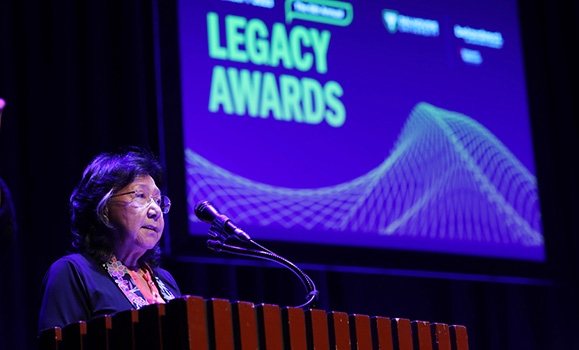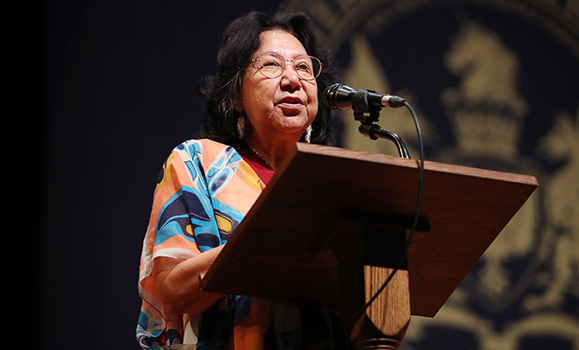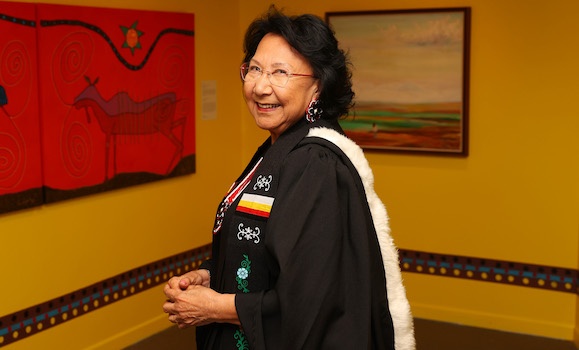On any sunny day, students can be found in green spaces studying. For Ann LaBillois, this was the scene she remembers at the Boston Common growing up.��
“I remember seeing students from local schools reading books and writing notes, thinking that maybe that could be me someday.”
Fast forward to now, LaBillois graduated today (Tuesday, May 28) with her Bachelor of Arts in Philosophy, joined by her three grandchildren to walk across the stage.��
Originally from Ugpi’ganjig (Eel River Bar), LaBillois returned to New Brunswick after growing up in Boston and worked as an addiction counsellor for 12 years. It wasn’t until after she retired that the thought of applying to university came back.��
“I really didn’t think about it. I just wanted to do it for the experience of filling out an application and then it became real.”
LaBillois remembers calling the Registrar’s Office to triple-check that the acceptance letter was sent to the right Ann LaBillois.
“When I came to campus, I stood down by the end of University Avenue. It was like walking in a dream. Am I actually here? I remember standing by the sign and you know, the tears just started coming because I was just so grateful.”
“My first class was in the McCain auditorium where you have 500 students in there,” LaBillois says, talking about the tiered Ondaatje Theatre. “I stood at the top and watched everyone flip open their computers when all I had was my little phone.”
Learning to study
The adjustment to university life came with surprises like these, and challenges.��
“I liked the courses, but I did not know how to study or take notes," she says. "I remember hearing students talk about highlighting the important pieces. I tried and highlighted the entire page. To me, it was all important.”
Next, she tried sticky notes and her apartment was covered. LaBillois couldn’t escape a feeling of apprehension. “I had a fear that I wouldn’t understand or that I didn’t know what I was reading. I think I was afraid that I didn’t see these words often, so I blocked myself off.”
Reframing the lessons as stories made all of the difference.
Learning about heritage
Storytelling is the traditional way to teach about cultural beliefs, values, customs, rituals, history, practices, relationships, and way of life in Indigenous culture, something LaBillois learned in her late teens.
“I had my parents, but they were doing what they thought was right. They were going through all of the trauma and everything of being told not to speak their language, not to do this and not to do that.”
“I never knew my dad was in a residential school. I never knew that I was taken away from my parents at eleven months old and in a sanitorium hospital for more than three years. I didn’t learn I was native until I was 16.”
“It’s that ripple effect that people talk about, and you don’t know you’re actually in it until one day something awakens you and then you have to start decolonizing your own mind.”
LaBillois describes going on a mission to find her people.
“I found and fell in love with these people. I understand why the truth was never spoken about,” she says. “It’s scary for the world now to talk about the truth. But the truth will set you free. Our people just want to connect again.”
Becoming an Elder in Residence
As a student, LaBillois made these connections again across campus. At the Indigenous Student Centre, she met Michele Graveline.
“Michele was just so, so welcoming and we got along really well. I was able to talk to her about a lot of things,” says LaBillois.��
Graveline passed LaBillois’ name along to Cathy Martin, Dalhousie’s director of Indigenous community relations, who reached out about the Elders in Residence program��– a program launched in 2015 to provide support and counsel to Indigenous students throughout their studies.��
Related reading:��Dal launches Elders in Residence program
“After speaking with Ann, I knew that she was the one to join us in helping students feel safe and connected to Dal. Ann’s life experience alone provided the students with a person who has overcome many challenges and her work as an addiction counsellor dealing with community, members, and families gave her an understanding of the professional protocols and counselling tools required for our communities,” says Martin. “I was also impressed that she had been pursuing her BA at a senior age to prove to herself that she was capable and worthy of it.”
LaBillois remembers the conversation well and thinking, “‘Do you think I could be an elder?’ I’m always asking that question. I said yes. I said I would be honoured.”
LaBillois reflects on her experiences connecting with other students. “It’s mostly about support for whatever goes on in their life. Sometimes you just need somebody to listen and the encouragement to continue on. That’s my favourite part — to encourage them to continue on.”
Welcomed across campus
In her role as Elder in Residence, LaBillois was welcomed across campus for openings, prayers, and relaxations.��

Elder Ann speaking to attendees at the Dalhousie Legacy Awards on November 10, 2023.
At event openings, LaBillois shares her goal to help attendees be in the moment.
“That’s something that our ancestors did all of the time. I find a great deal of peace in what others feel when they take a moment.”
“It’s funny because in the first part of our lives, we accumulate our thoughts, values and everything from everybody else — aunts, uncles, friends, relatives, people you know, teachers. The second part of our lives — whenever that happens — we start looking at things differently and working through it.”��
“Being in the moment has helped me to know what kind of relationship I have with my memories and sometimes those memories are not good at all. But I don’t need to be sad about them anymore. It happened and for me, I’ve changed that to be my strength.”��
Sharing lessons
In these moments of reflection, LaBillois also weaves in what she’s learned from other Elders and her family.
“I remember a lesson from another Elder. They asked me to look at the forest, trees, and grass and see what’s going on. I didn’t know. It was that they hold their arms up to the Creator, always giving thanks. We keep them down — walked on, flooded, burned — and they are still doing their best and holding their arms up,” says LaBillois. “Every once in a while, I hold my arms up, too.”
“My mom would tell me to look to see who needed a hug. A hug is a really special place where you’re allowing your heart to embrace the energy of the heart in front of you,” says LaBillois. “I hated it at the time, but now I give hugs to everyone.”
Martin adds, “Ann comes from a very strong family with many women leaders throughout their family generations. I knew her Aunt Margaret LaBillois very well. She was a Chief of her community, a veteran, an amazing artisan, and had the gentle loving caring spirit that I see in Ann.”
From the other side of the stage
Elders also play a key role in Convocation, where they lead graduating students into the ceremony, deliver welcomes, and hand out medicine pouches.����

Elder Ann delivering a traditional Mi’kma’ki welcome at Convocation on October 3, 2023.
��“I know sitting up there [on stage], and I think about what it’s going to be like sitting out there [as a graduating student]. I can’t even imagine. I know it’s going to be super special, just even to walk in, because usually I’m walking first.”
Related reading: Introducing the New Dawn Staff of Place and Belonging
Presented to graduating students to honour their Indigenous heritage, pouches have four medicines in them — sweet grass, sage, tobacco, and cedar and sometimes a stone.
“The bundles help your energies. They cleanse your mind, your eyes, your ears, and your tongue to think good thoughts, speak the truth, and listen to your heart.”
LaBillois shares that this medicine pouch could be the first that students receive, depending on their background and community. It can also be a special moment to create your own.��
“In the bundle that I made and carry now, I have pictures of my grandmother and great grandmother. I always have my community with me.”
A special presentation
Another sacred symbol in Indigenous culture is the eagle. The eagle holds a special place in the sky, flying higher than other birds and carrying prayers to the Creator. An eagle feather symbolizes respect, honour, strength, courage, and wisdom and is presented to individuals who have demonstrated outstanding leadership, integrity, and commitment to community.
After degrees were awarded, Labillois was invited back on stage and presented with a feather from her Chief.
“I am a very proud Chief today. One of our elders has graduated and she has put in so much dedication, hard work, and sacrifice,” says Chief Caplin. “On behalf of our community of Eel River Bar First Nation, I want to say congratulations to Elder Ann Labillois.”
��
What's next
When asked about what’s next, LaBillois says she’s not sure where life will take her.��
“It sounds weird but what makes me happy is when I wake up in the morning and I’m still breathing and that I’m still here. That is the happiest moment of my life, you know? I admit that I don’t know where I’m going, but wherever you (Creator) send me, I will do my best.”��
Martin adds, “Look out. I am sure that she isn’t done yet, and there will be more adventures ahead for her and hopefully we will share in some more of them.”��
It is still the beginning of LaBillois’ legacy — already profound and touching the lives of many.
“My grandkids don’t really know what it means that I’m back in school, but every once in a while Dalia will look up at me and say ‘Good job, Nugumi.’”��
��

